Annemarie Jacir’s third feature may have picked up a subtitle, “The Wedding Invitation”, for international distribution, but the key to her intimate portrait of Palestinian life seen through a father-son relationship lies in understanding the full nuance of its title. The word wajib, best translated from Arabic as “social duty”, is spoken only once in the film – an invitation is taken to an old lady whom the hosts know will be unable to attend, but they offer it because that is the accepted, the proper way in their society – but its concept pervades the entire film.
Jacir has located her story within the Palestinian Christian community in the Israeli city of Nazareth, where the tradition remains strong that the father of the bride must hand-deliver wedding invitations to family and friends, and that it’s the duty of his son to accompany him. Even though this is a community that is as geographically contained as it is closely bonded, it’s a task that can take days – not least because every stop brings an almost ritualistic invitation to drink coffee, another aspect of tradition that cannot be disregarded.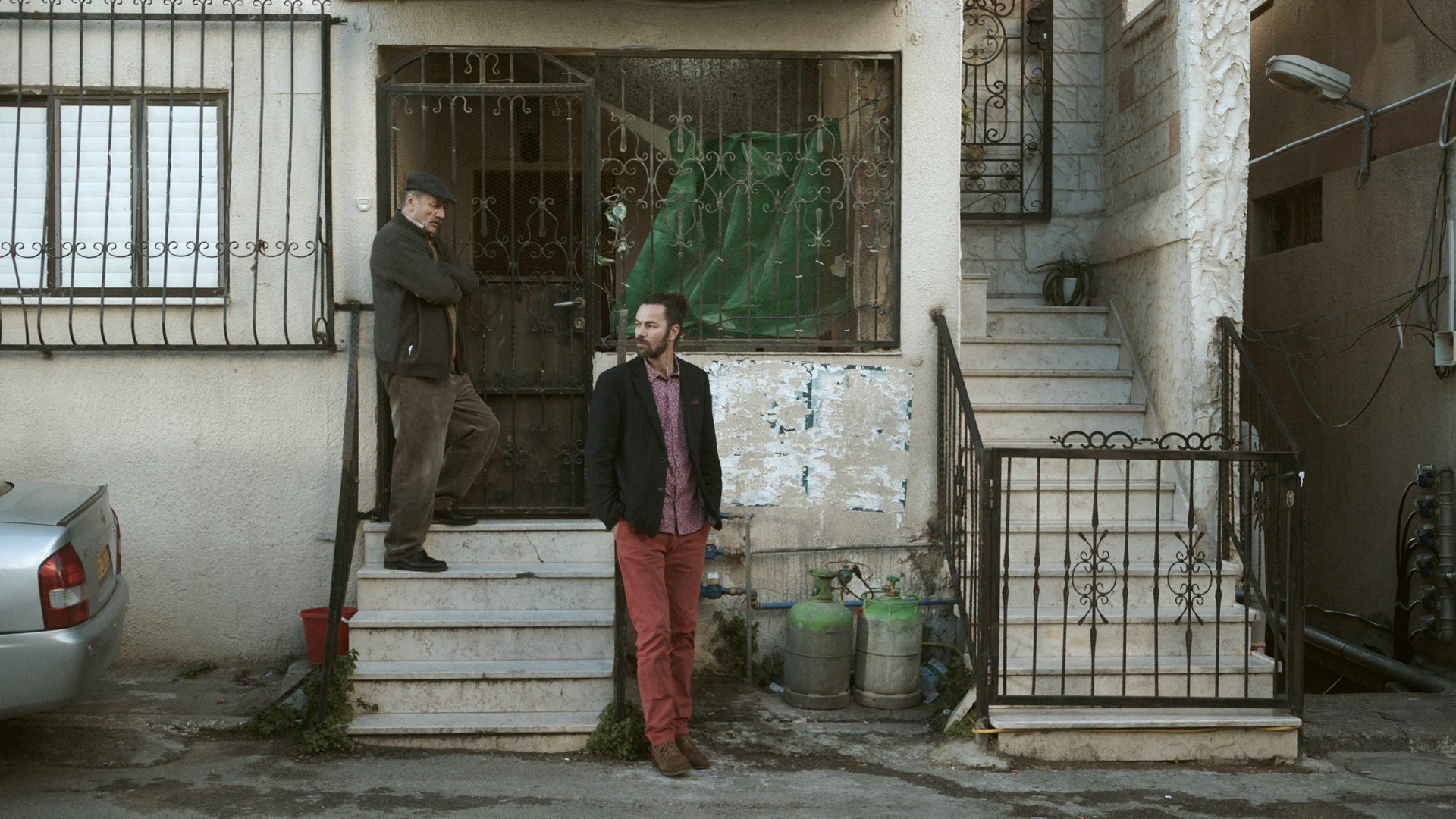 That may sound like a perfect opportunity for some père-et-fils quality time between sixty-something Abu Shadi and his man-bunned son, Shadi (Mohammad Bakri and Saleh Bakri, father and son in real life, pictured above), but in reality the sturdy old Volvo they are driving sometimes appears more resilient than their relationship. Jacir’s beautifully observed script skilfully outlines their wider circumstances and family story, taking in both the very particular realities of their life as Palestinians in a particular environment, as well as the general hazards and frictions of family life that might be found anywhere in the world.
That may sound like a perfect opportunity for some père-et-fils quality time between sixty-something Abu Shadi and his man-bunned son, Shadi (Mohammad Bakri and Saleh Bakri, father and son in real life, pictured above), but in reality the sturdy old Volvo they are driving sometimes appears more resilient than their relationship. Jacir’s beautifully observed script skilfully outlines their wider circumstances and family story, taking in both the very particular realities of their life as Palestinians in a particular environment, as well as the general hazards and frictions of family life that might be found anywhere in the world.
The difference between home and abroad is one central division between them. Shadi was sent abroad to study by his father, and has settled in Italy, where he works as an architect. The reasons for that earlier departure become clearer as the film proceeds, involving the general question of Abu Shadi’s necessary accommodation with the Jewish authorities – “I have to deal with them!”, he explains with the exasperation of the pragmatist – and is crystallised into one particular issue that gives rise to a strong late scene of angry conflict. That Shadi’s girlfriend is the daughter of an exiled PLO high-up only accentuates the distinction, emphasising the restricted reality of occupation against the broader perspectives of the diaspora. It doesn’t help that the younger man is forthright with his criticism of conditions in his erstwhile hometown, directed at everything from its street rubbish and neglect of architecture to the “closed minds" of its people.
The father can certainly be an awkward cuss on occasions, but has a humour that wins us over
The fact that his son has anchored his emotional life abroad clearly saddens his father, who would like nothing better than to marry him off to a local girl. He drops hints to that effect at almost every stop, lamenting that “It's too bad people don't marry their cousins anymore” when a family lunch introduces an independent female relative into the company. The older man’s sensitivity to the issue of marriage is no abstract matter, however: it gradually becomes clear that he himself is separated from his wife, who now lives with another man in New York, her return to the wedding proving complex in every sense. He had been left to look after their two children on his own, a blow that hit hard not only for personal reasons but because it broke with values and tradition, prioritising personal freedom over the kind of obligation that is there in the film’s title.
Bakri senior plays this with a wounded dignity that hits home, his face revealing more through craggy restraint than anything more obvious. He can certainly be an awkward cuss on occasions, but has a humour that wins us over, especially when set against the peremptory remoteness of his son: the experience of age, even when it has had to admit compromise, wins out over the intolerance of youth. “The most beautiful bride!” he exclaims simply to his daughter as she tries on wedding dresses (pictured below), his words spoken with such rich pride that they resound long after we forget all the younger man’s frustrations and anger.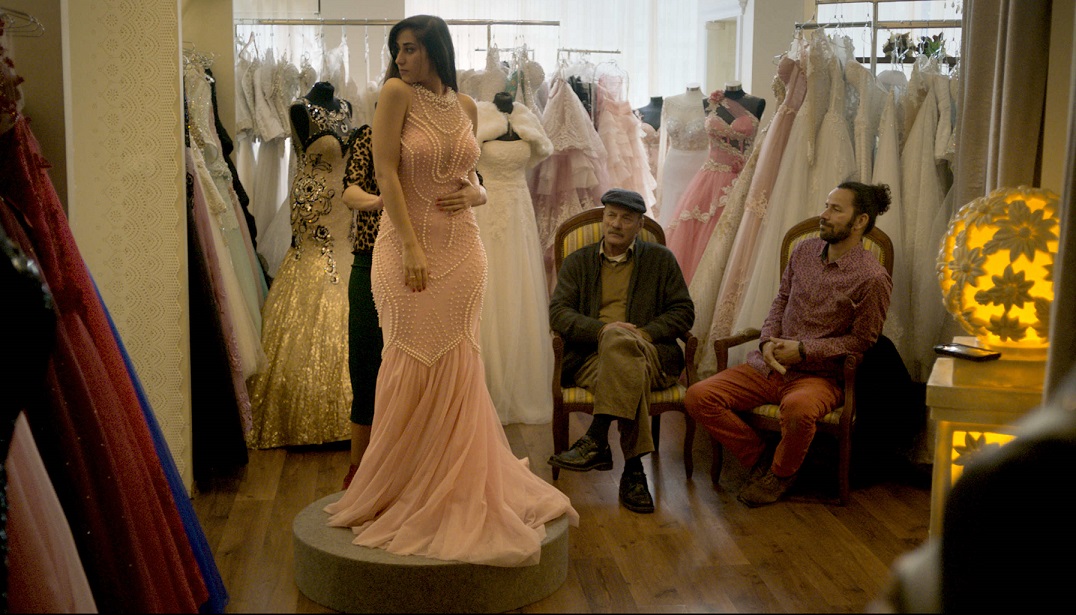 Wajib is a film anchored to its very depths in a particular territory, with Jacir giving us all the particular details of life of her chosen world – its everyday aspects but also a sense of its past, of roots that extend further back than any current politics. The director was born in Bethlehem and, after growing up in Saudi Arabia, education in New York, and some years based in Amman, has now returned to live there: we may wonder whether the profound humanism of her new film somehow reflects that relocation. It’s there in the film’s look, too: there’s little obvious beauty in the Nazareth locations, but they’re caught with real resonance, as well as poised framing by French cinematographer Antoine Héberlé (perhaps an outsider’s eye helps).
Wajib is a film anchored to its very depths in a particular territory, with Jacir giving us all the particular details of life of her chosen world – its everyday aspects but also a sense of its past, of roots that extend further back than any current politics. The director was born in Bethlehem and, after growing up in Saudi Arabia, education in New York, and some years based in Amman, has now returned to live there: we may wonder whether the profound humanism of her new film somehow reflects that relocation. It’s there in the film’s look, too: there’s little obvious beauty in the Nazareth locations, but they’re caught with real resonance, as well as poised framing by French cinematographer Antoine Héberlé (perhaps an outsider’s eye helps).
Jacir’s previous film, When I Saw You from 2012, overlapped a personal story with the wider circumstances of the history of her people. Wajib may appear to have narrowed its horizons, but in burrowing down to the essentials, allowing detail to speak volumes, she proves, resoundingly, that less can be far, far more.
Overleaf: watch the preview for Wajib
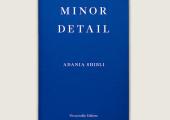


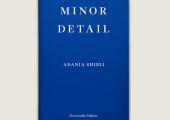
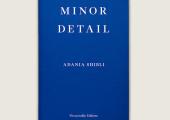



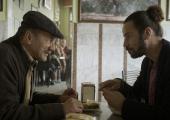
 That may sound like a perfect opportunity for some père-et-fils quality time between sixty-something Abu Shadi and his man-bunned son, Shadi (Mohammad Bakri and Saleh Bakri, father and son in real life, pictured above), but in reality the sturdy old Volvo they are driving sometimes appears more resilient than their relationship. Jacir’s beautifully observed script skilfully outlines their wider circumstances and family story, taking in both the very particular realities of their life as Palestinians in a particular environment, as well as the general hazards and frictions of family life that might be found anywhere in the world.
That may sound like a perfect opportunity for some père-et-fils quality time between sixty-something Abu Shadi and his man-bunned son, Shadi (Mohammad Bakri and Saleh Bakri, father and son in real life, pictured above), but in reality the sturdy old Volvo they are driving sometimes appears more resilient than their relationship. Jacir’s beautifully observed script skilfully outlines their wider circumstances and family story, taking in both the very particular realities of their life as Palestinians in a particular environment, as well as the general hazards and frictions of family life that might be found anywhere in the world. Wajib is a film anchored to its very depths in a particular territory, with Jacir giving us all the particular details of life of her chosen world – its everyday aspects but also a sense of its past, of roots that extend further back than any current politics. The director was born in Bethlehem and, after growing up in Saudi Arabia, education in New York, and some years based in Amman, has now returned to live there: we may wonder whether the profound humanism of her new film somehow reflects that relocation. It’s there in the film’s look, too: there’s little obvious beauty in the Nazareth locations, but they’re caught with real resonance, as well as poised framing by French cinematographer Antoine
Wajib is a film anchored to its very depths in a particular territory, with Jacir giving us all the particular details of life of her chosen world – its everyday aspects but also a sense of its past, of roots that extend further back than any current politics. The director was born in Bethlehem and, after growing up in Saudi Arabia, education in New York, and some years based in Amman, has now returned to live there: we may wonder whether the profound humanism of her new film somehow reflects that relocation. It’s there in the film’s look, too: there’s little obvious beauty in the Nazareth locations, but they’re caught with real resonance, as well as poised framing by French cinematographer Antoine 
